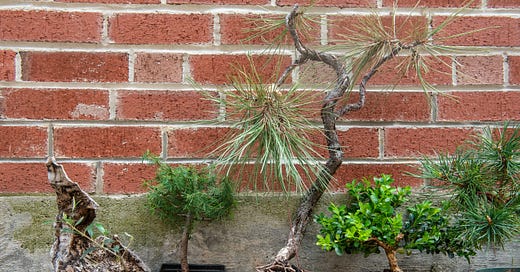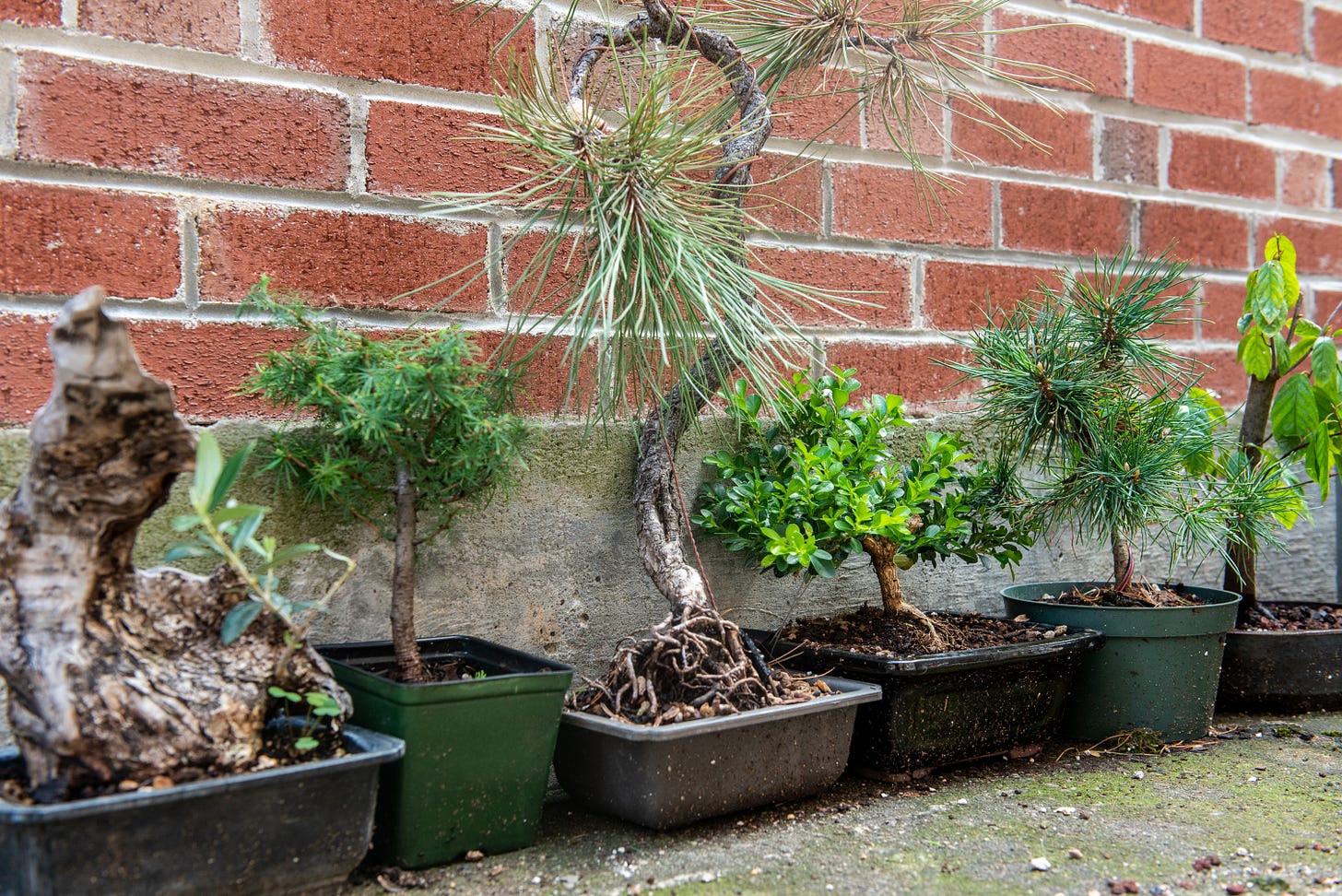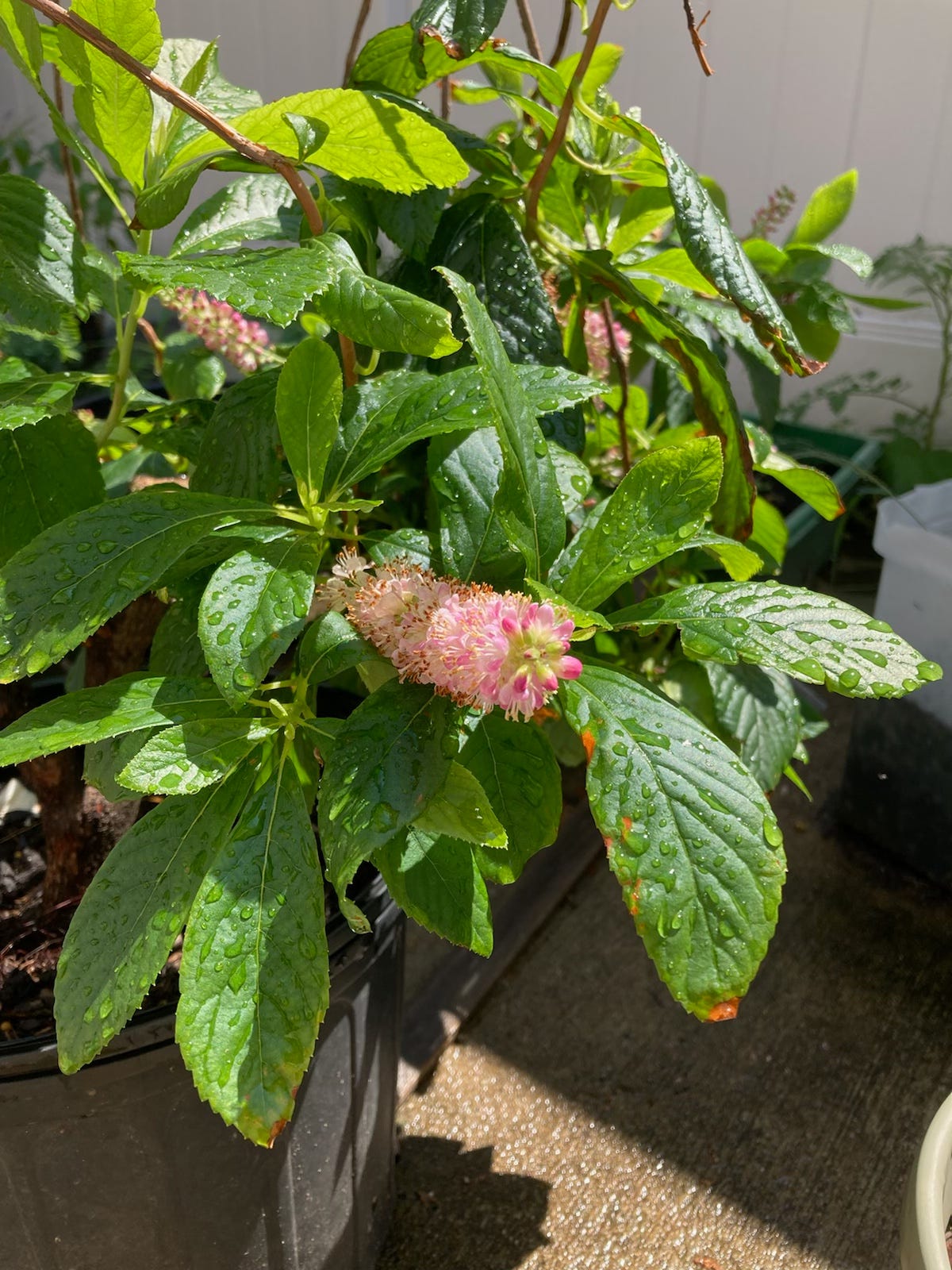A few weeks ago, my building’s management company wrote me to schedule insurance-mandated support brackets for my air conditioners. Oh, and could you get all that tree shit off your windows?
The jig was up. I was crushed.
In the back of my mind I always knew this could happen. But in the last few months, what with bonsai becoming more of a thing for me, all I could see was a six-story vertical garden. And yet. Blocking access on a fire escape is most definitely and justifiably illegal, and I’ll admit I’d let things get out of hand.
What really got me was that after days of nail-biting back and forth, I couldn’t argue any way to keep the plant shelf I built out of my bedroom. I knew it was perfectly safe—I’ve run it through plenty of stress tests—but to management, this was just one more issue to check off their building inspection list, and I needed to fall in line.
I wrote a proposal asking for access to the small space behind our building, to make a little bonsai exhibit. The “garden” is half pavement, half untended turf. Our neighbors across the fence have a much more lively horticultural display. I’d been meaning to ask the coop board about this in a way that wouldn’t snitch on my current illicit garden. Maybe, I wondered, this could be a blessing in disguise.
Nope.
For a combination of insurance and accessibility reasons, the broken pavement in the garden would need to be fixed to make it “suitable” for public access. This pavement is no more broken than a public sidewalk in Bushwick, but apparently would cost $100,000 to repair. What if I signed a release? Then they’d have to offer it to everyone and they’d be back in the same pickle. The same issue for the roof. Accessibility codes in New York require regular elevator access to a rooftop intended for public use. No way that was making my building’s budget.
I want to be totally clear that I’m in full favor of the Americans With Disabilities Act and stand behind the activists who’ve gone through hell fighting for equal access. Navigating New York City in particular is a nightmare for anyone who uses a wheelchair. And making accommodations isn’t just the right thing to do for disabled people; it usually improves quality of life for everyone. I don’t have a diagnosed hearing disability, but I sure appreciate the ubiquity of subtitles on streaming video now—even on media pirated for free, isn’t that nice?
And yet in this case, I feel like the letter of the law is getting in the way of its spirit. It doesn’t help that as I write this, there are several bad-faith actors using the ADA for the accessibility equivalent of patent trolling, to the tune of filing hundreds of lawsuits each against businesses they haven’t even visited. Since the case law on ADA compliance is still being written and its exact policies are subject to change, most businesses choose to settle, which is of course what the people suing them want. I know a few small operators who’ve been hit hard by this. And in the end, the sued-about accommodations usually don’t get made. The only ones who seem to benefit are the lawyers.
Legal hazards are only one of many reasons why these spaces go to waste across the city. Paperwork or not, money is a factor. So is turning a niche and forgettable issue into a priority for a diverse crowd who mostly want to be left alone. In my neighborhood, the old guard are bitterly opposed to people actually using the private courtyards in their buildings. Real ur-Karen behavior. The New York Times wrote about it.
All these obstacles keep potential gardens throughout New York from blooming into being. Of course people are going to put plants on their fire escapes!
Despite living here most of my life, New York still has a certain incandescent wonder to me. Things happen here. The membranes between our reality and others are thin in New York. I think this garden snafu has snatched some of that wonder from me.
My pal Nissan has generously agreed to board my bigger trees that need their own space. With more hours of sunlight than usual, they’re thriving. Here’s a photo he sent of my clethra in full bloom. I’ve been waiting months for this, and seeing it through a screen is hardly the same. I want to be happy for the tree. I’m trying.
I’ve also found—through Nextdoor of all places—a neighbor who’s helping me with more space. He lives a block away and is a big time VP of his coop board, so his word is law, and now I pay 50 bucks a month to his coop to keep my trees in their under-used garden, and get regular access to water them. So far it’s working out alright. It’s been a weird and entertaining way to get to know a neighbor. But I’m concerned about the sunlight and really don’t relish making appointments to see my plants. We’ll see how it goes. The arrangement has restored some of my faith in Queens to make things happen.
If anyone reading this has a lead on a garden space near Jackson Heights that might be down to mess around with some bonsai, I’d love to talk to people about a better solution. I’m holding out hope there’s a way to make this happen, and that New York won’t pull the ground from beneath my feet.
The crisis in Afghanistan is a horror story that could only be brewed in America, and for a mix of personal and political reasons I want to share these remarks that non-Afghan Americans like me should stew with before offering some half baked solution straight from Archimedes’ bathtub. As a “media professional” it worries me to see newsrooms race to normalize the country’s turmoil while simultaneously distorting regular Afghan people into stereotypes to fit various agendas. While a humanitarian disaster unfolds we’re flooded with stories that prioritize DC horse-racing, abstract feminist discourse in a proxy culture war, and cartoonish understanding of the occupying actors. This is our Vietnam. Then and now, people in power do all they can to minimize their responsibility while insisting that these campaigns of American empire are necessary and just. They have yet to be proven right. Don’t let them get away with it.





